- Home
- Mark Hodder
Macallister Fogg 1: The Master Mummer's Mummy (The Adventures of Macallister Fogg)
Macallister Fogg 1: The Master Mummer's Mummy (The Adventures of Macallister Fogg) Read online
THE ADVENTURES OF THE SOMEWHAT SINGULAR MR MACALLISTER FOG
1
THE MASTER MUMMER’S MUMMY
MARK HODDER
Text copyright © 2013 Mark Hodder
All Rights Reserved
To George Mann
MR MACALLISTER FOGG & MRS EMMA BOSWELL
In the years before the incomparable Sherlock Holmes drove away the competition, and despite his arrogant claim to be the first of his kind, Baker Street was filled with consulting detectives. Among the investigators who worked out of that famous thoroughfare, none experienced such a capricious career as Mr Macallister Fogg.
To judge Fogg against Holmes would be entirely unreasonable, for the two men couldn’t be more different in character. Where Holmes was driven and precise, Fogg was a feckless dabbler, concerned more with his mechanical inventions and chemical experiments than with the solving of his clients’ problems. Undoubtedly, had he not taken on Mrs Emma Boswell as his secretary, he’d have quickly gone out of business and there’d be no record of his eccentricities or the remarkable threats he encountered and somehow nullified. It is fair to say that Fogg, on more than one occasion, saved not just his clients but the Earth itself, and certainly could not have done so without the long suffering Mrs Boswell at his side.
Emma Boswell was married in May of 1855 and possibly widowed just three months later when HMS Thunderclap—captained by her husband, Bertram “Big Nose” Boswell—was declared lost at sea. By the end of that evil year, she’d been swindled out of her marriage home by three nefarious financiers and was forced to rely solely on a small pension provided by the Admiralty. Not one to dwell on misfortune, she accepted a position as Macallister Fogg’s secretary, hoping to acquire from him enough skills at deduction that she’d be able to herself bring the financiers to justice while also piercing the veil of government secrecy surrounding the fate of her husband’s ship.
It wasn’t long before Mrs Boswell concluded that in Fogg she’d chosen the worst possible teacher. However, their affiliation achieved an unorthodox functionality due almost entirely to her turning him into a star of the penny dreadful, The Baker Street Detective.
Of that story paper much has been written elsewhere and only a brief overview of its history is required here (fuller—though contradictory—accounts can be found in Square Shoulders and Stiff Upper Lips: The Empire in the Penny Bloods by Geoffrey Q. Hawthorne, Quilted Press 1978, and Never Trust Johnny Foreigner by F. Lomax and N. P. Giddy, Peddle Fast Publishing 1994).
It was in November of the year 1849 that Lord Tristan Hardy-Beddington, owner of Consolidated Press, approached one of his editors, Cyril Botty, and ordered the creation of a new story paper “for boys and girls and men and women.”
Inspired by the recent creation of the Metropolitan Police Force, Hardy-Beddington demanded tales of crime, investigations and justice, but most of all he was after a paper that would outshine (and, most importantly, outsell) the penny bloods that crowded every newsstand in the country.
Detective Force Weekly was launched on 1st July 1850. It was published on Thursdays and cost half a penny. Containing one original story and two serial instalments each week, it was marred by badly plotted and often highly illogical tales, by slapdash writing and, most of all, by the lack of an ongoing character.
By the summer of 1853, the publication was struggling. Hardy-Beddington responded by kicking Botty out of the office, and in what many considered an impulsive and desperate move, promoted a seventeen-year-old office boy, Archibald Swingle, to the editorship. Under Swingle’s guidance, the quality of writing rapidly improved, as did sales, but Detective Force Weekly remained an unremarkable publication until November 1856 when it relaunched as The Baker Street Detective. This change was prompted by a story that had been delivered by hand to Swingle three months previously. Entitled The Affair of the Fashionable Phantom, it was a wildly exaggerated account of what had actually been a very prosaic investigation undertaken by Macallister Fogg. Written and delivered on a whim by Emma Boswell, the story was published under the pen name of “Gideon F. Croon” in Detective Force Weekly issue 326, dated 2nd October 1856. It proved so popular that Swingle commissioned a second tale. The Mystery of the Fluttering Moth appeared in issue 328 on 23rd of October, with Mrs Boswell’s pseudonym acquiring a different middle initial: Gideon J. Croon. With so few copies of Detective Force Weekly surviving the tribulations of time, these two stories have become the most rare and collectable of all the Macallister Fogg tales.
With the fictionalized version of Fogg, Lord Tristan Hardy-Beddington realized his young editor had hit a vein of gold, and thus came about the relaunch and change of title. The Baker Street Detective was branded as “Macallister Fogg’s Own Paper,” and featured a new and complete story of the “Inventor Detective” in every one of its eventual 1,531 issues. All appeared as written by “Gideon J. Croon,” but whether all were actually penned by Emma Boswell remains a source of much debate.
The Baker Street Detective folded on 11th March 1886, less than two years before Sherlock Holmes first appeared in print. By this point in time, the real Macallister Fogg had been missing for twenty-three years.
The truth of his existence, and what ultimately happened to him, became apparent when, on 29th June 2008, a strongbox was unearthed from a building site, the location of which, for purposes that cannot be stated, must at present remain secret. The box contained complete accounts of Fogg’s real cases, as recorded by Mrs Boswell, which, though they reveal him to be a far cry from the square-jawed hero of The Baker Street Detective, easily rival his penny dreadful tales by virtue of their sheer outlandishness.
Truth, it appears, really can be stranger than fiction.
THE MASTER MUMMER’S MUMMY
I
Plumes of steam billowed upward into the crisp winter air, rising over the crowd in front of Mr Macallister Fogg’s house. A loud detonation sounded and everybody jumped. People shouted. A horse whinnied and relieved itself. A woman screamed.
Mrs. Emma Boswell, who’d just rounded the corner, stopped, surveyed the throng, and groaned, “Heavens above, what is he up to now?”
Since the unfortunate disappearance of her husband, Captain Bertram “Big Nose” Boswell, who’d vanished during a mysterious incident involving his ship, HMS Thunderclap—an affair the British government remained singularly tight-lipped about—Emma had lived in compact but comfortable lodgings over converted stables in Blandford Mews, less than five minutes’ walk from Fogg’s residence. A small stipend from the Admiralty covered her rent but very little else, which is why, some eight months ago, she’d taken a position as secretary to Macallister Fogg. He was one of the many consulting detectives who worked out of Baker Street, which was to London’s investigators what Savile Row was to its tailors and Hatton Garden to its jewellers. Initially, she’d hoped to learn something of the art of detection from him, for it was her avowed intention to somehow penetrate the veil of secrecy that surrounded the fate of the Thunderclap, and to also bring to justice the three financiers who, after Captain Boswell was declared dead, had cheated her out of her marriage home. It wasn’t long though before she’d learned everything she could from Fogg, namely that he was inept, lazy, and quite possibly mad.
While his rivals prospered, Fogg frittered away his days indulging in his various hobbies, which included chemical experimentation and mechanical engineering. He was hired, infrequently, only to inquire into the most humdrum of affairs, such as those concerning stolen meat pies or wayward
ladies’ maids.
Two months into her job, when it became apparent to Emma that her employer was so spendthrift she’d be lucky to ever get a wage out of him, she was on the point of resigning when she instead hit upon an extraordinary idea. While writing up, for the records, a case involving the petty theft of a worthless but treasured tricorn hat, she became so bored that she started to add entirely fictional and highly unlikely perils, hair’s breadth escapes, and plenty of chases and fisticuffs. She laughingly turned Macallister Fogg into a stiff upper lipped hero, and the thief—who in reality was a disgruntled gardener—into a vengeful ghost. On a whim, she then submitted the resultant tale, which she’d entitled The Affair Of The Fashionable Phantom, to Consolidated Press, publisher of countless penny dreadfuls. To her surprise, a few days later she received a cheque and a request for another story featuring the redoubtable detective, Macallister Fogg.
Thus had begun a rather unconventional and sporadically fruitful association, with Fogg bumbling along while Emma Boswell exaggerated his every case for publication in what was already fast becoming the country’s best-selling story paper, The Baker Street Detective.
She was holding the latest issue of that publication rolled in her hand. It was dated January 8th 1857, and the cover was adorned with an illustration of a man grappling with a giant sea monster beneath the words: The Terror of the Terrible Tentacles!
Another explosion echoed along Baker Street and more steam curled upward. The horse made a second deposit onto the cobbles. Someone shouted, “Lawks! You’ll ‘ave the blessed windows in with that bloomin’ racket!”
Emma crossed the road and shouldered her way into the congregation. She was an unfashionably tall woman, and unafraid to use her strength and bony elbows to shove people aside. Those who opened their mouths to object quickly swallowed their words when they saw the steel in her green eyes and the determined set of her slightly-too-angular-to-be-pretty jaw.
She heard something rattling and snarling and caught brief glimpses of a contraption positioned at the side of the road in front of Fogg’s house. Emerging into the open—the crowd was standing ten feet back from the thing it was gawking at—she strode across the space to join her employer, who was bending over one side of the shaking, panting apparatus.
“Mr Fogg!” she called above the noise. “What on earth are you doing? What’s all this?”
Fogg, dressed in a long leather overcoat, with a woollen scarf around his neck and a pair of goggles over his bright blue eyes, straightened up and cried out, “Ah ha! Bang on time as usual, Mrs Boswell. Nine o’clock sharp, hey!”
He was a short and thickset man, with broad shoulders and a big chest, pugnacious features and an enormously wide brown moustache.
“It’s ten past ten, Mr Fogg, and it’s Saturday morning. I don't work on Saturdays as you well know. I came simply to push the latest edition of The Baker Street Detective through your letterbox.”
“Saturday, is it? I say! Already? But, my dear woman, I’m absolutely relying on you to accompany me to Battersea.”
“Battersea?” She looked at the steaming machine, which, she noted, was mounted on three tall narrow wheels and had a leather armchair at what, she assumed, was its front. “Are you visiting the owner of a Turkish bath, perchance?”
Fogg looked puzzled for a moment then exclaimed, “Ha! The steam! A deduction! Marvellous! Well done, dear lady! Well done! No, I’m not. Have you heard of Professor Theodore Swatt-Godfrey?”
The machine suddenly let loose a loud discharge, like the firing of a cannon. The crowd screamed and shouted, and a woman, who’d manoeuvred herself to the side of one of the more handsome onlookers, took careful measure then swooned theatrically into his arms.
“Air in the pipe,” Fogg said. “It’ll clear once we get moving.”
Emma asked, “Swatt-Godfrey? Who is he?”
“A chemist, and a very good one, too.” The detective bent over a gauge and declared, “Heat’s up! All ship-shape and Bristol fashion! Climb aboard!”
Emma eyed the armchair dubiously. “You mean this thing is a conveyance, Mr Fogg?”
“Of course! I’ve been tinkering away at the blessed thing for months. I call it a Horseless Wagon. Don't worry, it’s perfectly safe.”
“That, Mr Fogg, is exactly what you said about your anti-gravity formula, which last week crashed through the bottom of a test tube, passed right through the workbench, made a hole in the floor, and which I suspect is at this moment still drilling its way toward the centre of the planet.”
“Crikey!” Fogg cried out. “You’ve hit the proverbial nail on its absolute head! I suppose it was my mention of the chemist that prompted it.”
Emma threw up her hands. “Prompted what? I have no notion what you are babbling about, sir.”
“That very formula, Mrs Boswell. It is perfected. I have been corresponding with Professor Swatt-Godfrey and have settled upon two compounds, which, when blended together, will, I am positive, result in a liquid that’ll be repelled by gravity. You know what that means, don't you?”
Emma rolled her eyes.
“Mars!” Fogg crowed. “We’ll be able to solve the mystery of Mars!”
He was referring to activity that had recently caught the attention of astronomers the world over. The red planet had come alive with odd bursts of light, which had been clearly observed flickering across its surface. Many were of the opinion—and Fogg shared it—that the phenomenon was evidence of intelligent life on Earth’s neighbour.
The detective reached into the left side, then the right side, of his overcoat and pulled out two small flat glass flasks, one filled with a deep red liquid, one with inky blue. “Formula A and Formula B,” he announced. “I must confess, I’ve been very nervous about carrying both upon my person. Were I to fall over and break them, and the compounds to mix, I would in all likelihood be immediately flung into the farthest reaches of outer space. That’s why it’s so essential that you accompany me to the professor’s, you see. For safety’s sake, I require you to carry one flask, while I carry the other. We must deliver them to him along with the records of the experiment, which I have in my pocket.”
Reluctantly, Emma accepted the little container of blue liquid and slipped it into her jacket.
“But surely, if you’ve been working together, he already knows how to make the stuff?” she said.
“Not at all. He merely advised on certain aspects without knowing what I intended as the end result. Now I shall to demonstrate to him exactly what he’s been contributing to. A liquid that will change the world!”
“And we are to visit him in this monstrosity?” she asked, indicating the Horseless Wagon.
“Quite so! Take a seat, madam. We must be off at once. The pressure will build to a dangerous level if we don't get the blessed thing moving at once.”
Upon hearing this pronouncement, the crowd backed away and Emma Boswell swallowed nervously. Macallister Fogg clambered onto a footboard and slid onto the armchair, which was suspended between the two big front wheels. He slapped at the seat’s thick upholstered arm. “You’ll have to ride here, side-saddle,” he proclaimed with a wide grin.
Reluctantly, Emma moved to the front of the machine, lifted her skirts and petticoats, stepped onto the footboard, and positioned herself as suggested. It proved more comfortable and secure than she’d anticipated.
She looked down at her employer and said, “This is very inconvenient, Mr Fogg. I intended to shop for a new shawl today. If you remember, my old one got caught in your cigar dispenser and was ripped to pieces.”
Macallister Fogg took hold of a tiller-like steering rod and squeezed a small lever at its end. Behind the armchair, the steam engine shook violently, gave a chesty cough, and expelled vapour. The vehicle jerked forward. The crowd yelled and scattered. Emma pulled her skirts away from the wheel spokes.
“Off we jolly well go!” Fogg cheered. “Ta ra! Ta ra!”
His invention lurched out into the road, narrow
ly missed panicking onlookers, and went chugging down Baker Street, picking up such speed that Emma feared her brain might be pushed against the back of her cranium resulting in unconsciousness and possibly even death. Horses bucked in fright and ran onto the pavements, dragging carriages and merchant wagons behind them. People hollered and shook their fists in the air. Dogs barked and ran along snapping at the wagon’s wheels. Street urchins gambolled along to either side of it, whooping and jeering and shouting things that, fortunately, were drowned out by the loudly grumbling engine.
“Gee up! Gee up!” Fogg shouted.
Trailing steam and chaos behind it, the contraption passed down the length of Baker Street and Orchard Street, crossed Oxford Street, and carried on along Audley Street, through Mayfair, past the south-western edge of Green Park, through Belgrave and Chelsea, then crossed the bridge and turned toward Battersea.
II
It was nearly midday when Macallister Fogg steered his clattering vehicle alongside Battersea Park and nearly ran over a man who plunged into the machine’s path with his arms waving and his mouth working. Fogg yanked the tiller to the right, which sent the Horseless Wagon careening to the left. It brushed past the man, mounted the pavement, and crashed into a lamppost. The detective and his secretary were sent flying from the seat. They somersaulted through the air to either side of the post and landed in a bush at the edge of the park.
“The flasks!” Fogg shouted, patting frantically at his pockets.
“Mine is undamaged,” Emma Boswell stated as she clambered to her feet. “Which is more than I can say for my dignity.”
“Cracked!” Fogg exclaimed, holding up Formula B. “But not leaking, thank goodness.”
The wagon emitted a death rattle and fell silent but for odd clicks and creaks as its pipes rapidly cooled.

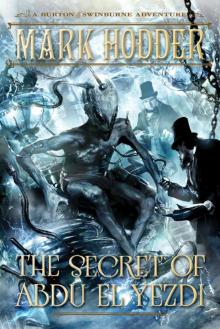 The Secret of Abdu El Yezdi
The Secret of Abdu El Yezdi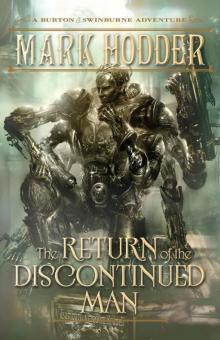 The Return of the Discontinued Man
The Return of the Discontinued Man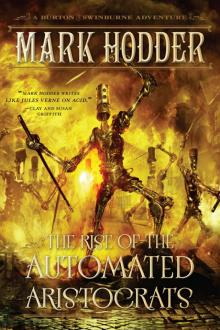 The Rise of the Automated Aristocrats
The Rise of the Automated Aristocrats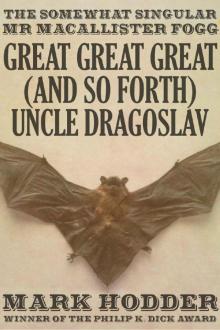 Macallister Fogg 2: Great Great Great (And So Forth) Uncle Dragoslav
Macallister Fogg 2: Great Great Great (And So Forth) Uncle Dragoslav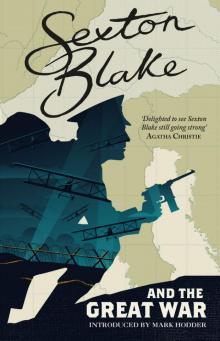 Sexton Blake and the Great War
Sexton Blake and the Great War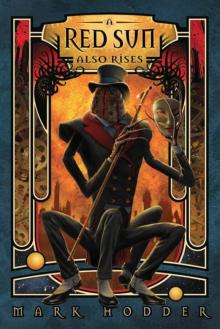 A Red Sun Also Rises
A Red Sun Also Rises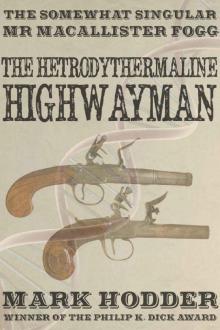 Macallister Fogg 3: The Hetrodythermaline Highwayman
Macallister Fogg 3: The Hetrodythermaline Highwayman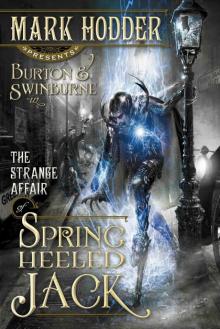 The Strange Affair of Spring Heeled Jack
The Strange Affair of Spring Heeled Jack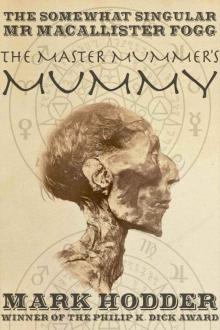 Macallister Fogg 1: The Master Mummer's Mummy (The Adventures of Macallister Fogg)
Macallister Fogg 1: The Master Mummer's Mummy (The Adventures of Macallister Fogg)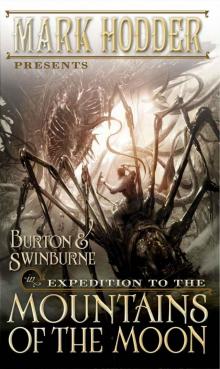 Expedition to the Mountains of the Moon bas-3
Expedition to the Mountains of the Moon bas-3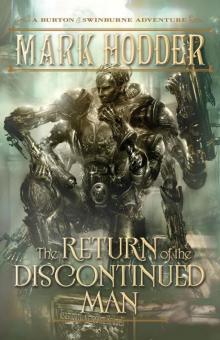 The Return of the Discontinued Man (A Burton & Swinburne Adventure)
The Return of the Discontinued Man (A Burton & Swinburne Adventure)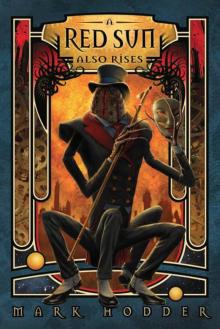 Red Sun Also Rises, A
Red Sun Also Rises, A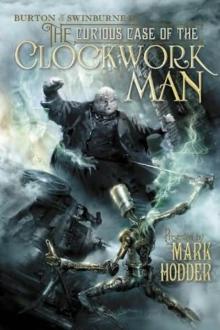 The curious case of the Clockwork Man bas-2
The curious case of the Clockwork Man bas-2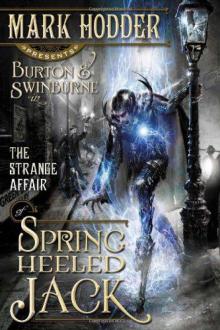 The strange affair of Spring-heeled Jack bas-1
The strange affair of Spring-heeled Jack bas-1